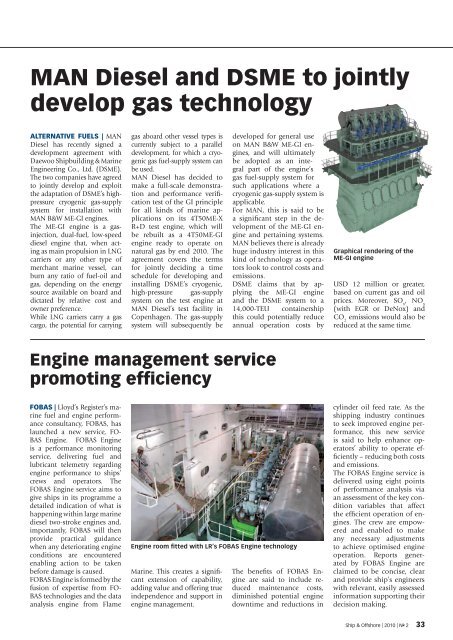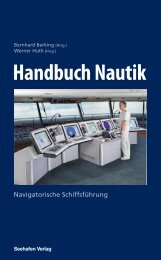| 2 | 2010 - Schiff & Hafen
| 2 | 2010 - Schiff & Hafen
| 2 | 2010 - Schiff & Hafen
Create successful ePaper yourself
Turn your PDF publications into a flip-book with our unique Google optimized e-Paper software.
MAN Diesel and DSME to jointly<br />
develop gas technology<br />
ALTERNATIVE FUELS | MAN<br />
Diesel has recently signed a<br />
development agreement with<br />
Daewoo Shipbuilding & Marine<br />
Engineering Co., Ltd. (DSME).<br />
The two companies have agreed<br />
to jointly develop and exploit<br />
the adaptation of DSME’s highpressure<br />
cryogenic gas-supply<br />
system for installation with<br />
MAN B&W ME-GI engines.<br />
The ME-GI engine is a gasinjection,<br />
dual-fuel, low-speed<br />
diesel engine that, when acting<br />
as main propulsion in LNG<br />
carriers or any other type of<br />
merchant marine vessel, can<br />
burn any ratio of fuel-oil and<br />
gas, depending on the energy<br />
source available on board and<br />
dictated by relative cost and<br />
owner preference.<br />
While LNG carriers carry a gas<br />
cargo, the potential for carrying<br />
gas aboard other vessel types is<br />
currently subject to a parallel<br />
development, for which a cryogenic<br />
gas fuel-supply system can<br />
be used.<br />
MAN Diesel has decided to<br />
make a full-scale demonstration<br />
and performance verifi -<br />
cation test of the GI principle<br />
for all kinds of marine applications<br />
on its 4T50ME-X<br />
R+D test engine, which will<br />
be rebuilt as a 4T50ME-GI<br />
engine ready to operate on<br />
natural gas by end <strong>2010</strong>. The<br />
agreement covers the terms<br />
for jointly deciding a time<br />
schedule for developing and<br />
installing DSME’s cryogenic,<br />
high-pressure gas-supply<br />
system on the test engine at<br />
MAN Diesel’s test facility in<br />
Copenhagen. The gas-supply<br />
system will subsequently be<br />
Engine management service<br />
promoting effi ciency<br />
FOBAS | Lloyd’s Register’s marine<br />
fuel and engine performance<br />
consultancy, FOBAS, has<br />
launched a new service, FO-<br />
BAS Engine. FOBAS Engine<br />
is a performance monitoring<br />
service, delivering fuel and<br />
lubricant telemetry regarding<br />
engine performance to ships’<br />
crews and operators. The<br />
FOBAS Engine service aims to<br />
give ships in its programme a<br />
detailed indication of what is<br />
happening within large marine<br />
diesel two-stroke engines and,<br />
importantly, FOBAS will then<br />
provide practical guidance<br />
when any deteriorating engine<br />
conditions are encountered<br />
enabling action to be taken<br />
before damage is caused.<br />
FOBAS Engine is formed by the<br />
fusion of expertise from FO-<br />
BAS technologies and the data<br />
analysis engine from Flame<br />
developed for general use<br />
on MAN B&W ME-GI engines,<br />
and will ultimately<br />
be adopted as an integral<br />
part of the engine’s<br />
gas fuel-supply system for<br />
such applications where a<br />
cryogenic gas-supply system is<br />
applicable.<br />
For MAN, this is said to be<br />
a signifi cant step in the development<br />
of the ME-GI engine<br />
and pertaining systems.<br />
MAN believes there is already<br />
huge industry interest in this<br />
kind of technology as operators<br />
look to control costs and<br />
emissions.<br />
DSME claims that by applying<br />
the ME-GI engine<br />
and the DSME system to a<br />
14,000-TEU containership<br />
this could potentially reduce<br />
annual operation costs by<br />
Engine room fi tted with LR’s FOBAS Engine technology<br />
Marine. This creates a signifi -<br />
cant extension of capability,<br />
adding value and offering true<br />
independence and support in<br />
engine management.<br />
The benefi ts of FOBAS Engine<br />
are said to include reduced<br />
maintenance costs,<br />
diminished potential engine<br />
downtime and reductions in<br />
Graphical rendering of the<br />
ME-GI engine<br />
USD 12 million or greater,<br />
based on current gas and oil<br />
prices. Moreover, SO x , NO x<br />
(with EGR or DeNox) and<br />
CO 2 emissions would also be<br />
reduced at the same time.<br />
cylinder oil feed rate. As the<br />
shipping industry continues<br />
to seek improved engine performance,<br />
this new service<br />
is said to help enhance operators’<br />
ability to operate effi<br />
ciently – reducing both costs<br />
and emissions.<br />
The FOBAS Engine service is<br />
delivered using eight points<br />
of performance analysis via<br />
an assessment of the key condition<br />
variables that affect<br />
the effi cient operation of engines.<br />
The crew are empowered<br />
and enabled to make<br />
any necessary adjustments<br />
to achieve optimised engine<br />
operation. Reports generated<br />
by FOBAS Engine are<br />
claimed to be concise, clear<br />
and provide ship’s engineers<br />
with relevant, easily assessed<br />
information supporting their<br />
decision making.<br />
Ship & Offshore | <strong>2010</strong> | N o 2 33



